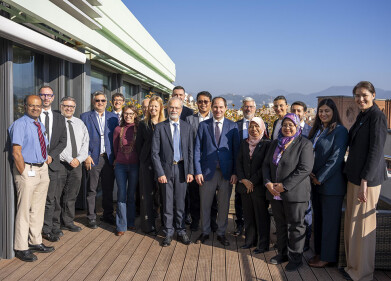Air clean up
Could an Electric Car Make Your Journey Quicker?
Oct 23 2016
In a bid to encourage consumers to favour electric vehicles (EVs) and cut down on emissions, the government are considering introducing measures which may slash journey times for environmentally-conscious motorists.
In addition to being handed choice parking locations and lower congestion charges, EVs might also be given priority at traffic lights and allowed to ignore one-way traffic systems. Taken together, these measures could drastically reduce EV journey times compared to their petrol and diesel counterparts.
Clean Air Zones across the UK
The proposed measures comprise just part of a UK-wide incentive to reduce the national emissions of carbon, nitrogen oxides and particulate matter, which currently exceed legal limits in many towns and cities. In fact, the UK has been fined repeatedly for its poor air quality by the EU, who are now demanding that the government take action in order to bring pollution levels into line with European policy.
Back in 2013, the Industrial Emissions Directive was brought into effect in the UK in order to try and curb harmful emissions from power plants and factories. While this measure has had some success in reducing total national emissions, it neglects the vast amounts of pollutants spewed into our atmosphere by vehicular traffic.
As a result, the government is forcing five cities across England to bring in Clean Air Zones. Birmingham, Derby, Leeds, Nottingham and Southampton will have until 2020 to introduce the new zones, with EVs expected to play a big role in curbing contamination in these pollution hotspots.
A multi-pronged attack on pollution
When it comes to tackling poor air quality, many critics believe that flexibility is key to solving pollution abatement problems. With this in mind, the government have proposed a wide range of measures intended to combat dirty emissions from passenger cars, buses, taxis and HGVs.
These proposals may take the shape of limiting the number of older vehicles on the road, especially when it comes to those operating in the public sector, such as buses and lorries.
However, the new incentives have gone a step further by prioritising EVs and encouraging motorists to embrace their technology more whole-heartedly. Though the practicalities of enforcing the suggested laws might be a little tricky, the Department of the Environmental, Food and Rural Affairs (DEFRA) are confident they can be achieved.
“It may be that in a one-way system they have an extra lane in which electric vehicles can go against the traffic or that they have filter lanes at traffic lights,” explained a spokeswoman for the department.
Not everyone is convinced
While the measures might represent a step in the right direction, not everyone is convinced of their efficacy or even of the feasibility of their implementation. Though Edmund King, the President of the AA, welcomed the proposals as “good short-term catalysts”, he was quick to highlight potential flaws in the idea.
“When EVs become mainstream congestion will still be the big issue,” he pointed out, before adding: “We are still baffled as to how EVs can realistically be given priority at traffic lights.”
Elsewhere, environmental lobbyists were even more sceptical of the government’s attitude in general.
“Requiring just five cities in the UK to introduce clean air zones doesn’t solve a national problem which causes thousands of premature deaths,” countered Alan Andrews, lawyer for the environmental organisation ClientEarth. ClientEarth have taken the UK government to court on several occasions for their failure to respond to deteriorating air quality levels across the country and Andrews branded the latest proposals as “too little, too late”.
Events
Feb 05 2025 Nantes, France
Feb 16 2025 Kampala, Uganda
Feb 26 2025 Chennai, India
Feb 26 2025 Tulsa, OK, USA
WATERTECH CHINA (GUANGDONG) 2025
Mar 05 2025 Guangdong, China












